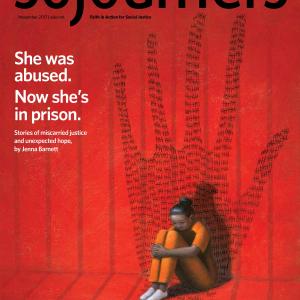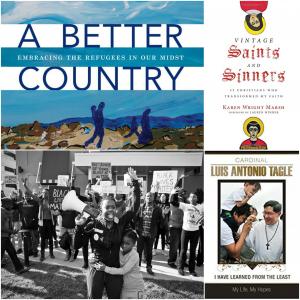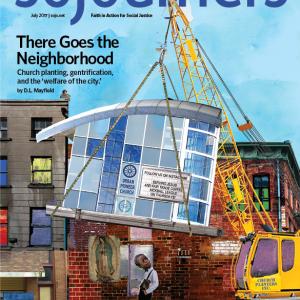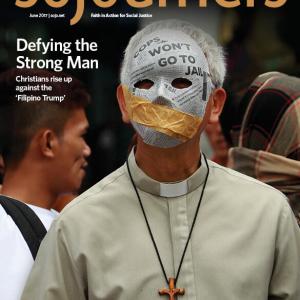Posts By This Author
Letters
A Prophetic Exchange
“How God Intervenes” (January 2018), with Kenyatta Gilbert and Walter Brueggemann, is a wonderful interview. How blessed we are to have these two wise and articulate prophets among us. There is so much insight in their challenging and inspiring exchange.
Joan O’Brien
Wethersfield, Connecticut
Political Drama, Then and Now
““DRAMATIC, POLITICAL, incendiary.” They seem like words you’d see splashed across the dust jacket of Fire and Fury, the controversial account of the Trump White House that generated a firestorm of presidential tweets when it was released earlier this year. But in this issue, Bible scholar Reta Halteman Finger uses those words to describe an older form of political drama: the book of Revelation.
Despite Revelation’s reputation as a harbinger of doom, Finger explains that the final book in the New Testament needs to be understood as an example of apocalyptic resistance literature, a genre of writing originally “intended to bring hope during times of political uncertainty or persecution.” This hope isn’t rooted in imperial acts of violence; it’s rooted in the victory of the Lamb, slaughtered but resurrected.
New & Noteworthy

image via pbs.org
A Voice of Compassion
Artist and activist Mavis Staples speaks to the increasing social divide in her latest album, If All I Was Was Black. In this interracial and multigenerational project, Staples doesn’t shy away from anger but, as always, her ultimate message is the promise of positive change. Anti- Records
Peacemaking with Purpose
Jon Huckins and Jer Swigart, co-founders of The Global Immersion Project, believe peacemaking practices should be grounded in Jesus’ teachings. Mending the Divides: Creative Love in a Conflicted World is full of stories, insights, and questions for discussion and shows what it means to live as a true global citizen. InterVarsity Press
Letters
Letters to the editor from Sojourners readers.
Beyond a Caricatured Hero
THE PAGES OF this magazine rarely feature scathing reviews, but in 2011 we made an exception.
That year, in our February issue, we published Nancy Lukens’ critique of Bonhoeffer: Pastor, Prophet, Martyr, Spy, by Eric Metaxas. Lukens, a German professor who translated many of Dietrich Bonhoeffer’s works into English, described the book as “stunningly flawed,” and lambasted Metaxas for trying to sculpt the 20th-century German pastor into an evangelical warrior on a crusade against liberal Christianity. Metaxas “does both Bonhoeffer and contemporary readers a gross disservice in implying that evangelicals are immune from the tragic error of merging nationalistic fervor with Christian piety,” wrote Lukens.
Fast forward seven years: Metaxas’ Bonhoeffer biography boasts a bestseller sticker, and a resurgence of nationalistic fervor helped win Donald Trump the White House—and the explicit support of many white evangelical leaders, including Metaxas.
Dreaming of A New World
IN WALTER BRUEGGEMANN'S first article for Sojourners, published in November 1983, he described the “radical break” we prepare for in Advent as “the Bible’s effort to break our imagination.”
In the decades that followed, Brueggemann’s keen analysis of scripture has called out some of the darkest practices of American empire, including consumerism, gun violence, financial corruption, environmental exploitation, and sexual assault. But while he’s never shied from speaking truth to power, Brueggemann has repeatedly emphasized that the core of the prophetic vocation isn’t merely to rebuke unjust systems, but rather, as he wrote in 1983, “to think a genuinely new thought, to dream of a genuinely new world that will displace the old failed one.”
New & Noteworthy
Faith in the Dark
Indie rock singer and Memphis native Julien Baker examines sexual identity, Christianity, and mental health in her latest album, Turn Out the Lights. Influenced by the Episcopal Church’s Book of Common Prayer, Baker’s album is a meditation on empathy and unity. Matador Records
Memoir of Survival
Nadia Murad was just 21 years old when she was forced into the ISIS slave trade in northern Iraq. Now a human rights activist, Murad details her narrow escape in The Last Girl: My Story of Captivity, and My Fight Against the Islamic State. Tim Duggan Books
Letters
Letters to the editor from Sojourners readers
New & Noteworthy
Heartland Heroes
Best-selling author Miriam Horn of the Environmental Defense Fund brings her timely book Rancher, Farmer, Fisherman to life in a new documentary. Narrated by award-winning journalist Tom Brokaw, the film highlights five surprising “conservation heroes” working to protect the land they love. rancherfarmerfisherman.com
A Daily Gift
In Gift and Task: A Year of Daily Readings and Reflections, renowned Old Testament scholar and theologian Walter Brueggemann provides daily reflection on scripture. Beginning with Advent, Brueggemann invites readers to critically consider the “cost and joy of discipleship.” Westminster John Knox Press
No Place Like Home
DURING THE HOLIDAYS, many of us go home. But home can be a tricky place these days. Pass the coffee and the pumpkin pie, but could we please skip the conversations with relatives who disagree with us about immigration, racism, climate change, and, well, pretty much everything?
Nope, says Katharine M. Preston in “An Experiment in Neighborly Love.” In a time of intense polarization, “talking exclusively with those with whom we agree simply hardens our positions and makes us angrier,” she writes in this issue. Instead, she challenges us to an “experiment”: gathering people with a wide range of ideological views to listen to one another. Some may see this practice as “hopelessly passive, naïve, and a waste of time,” she admits, but building empathy across the partisan divide could go a long way toward ending the cycle of alienation and frustration that makes people susceptible to fear-based rhetoric.
Our cover story offers another kind of homegoing.
What Can Churches Do to Respond to the Opioid Crisis?
In June, Bishop Ed Malesic of Greensburg, Pa., released “A Pastoral Letter on the Drug Abuse Crisis: From Death and Despair to Life and Hope.” In it he outlined several “first steps” that parishes could take in response to the region’s opioid epidemic.
Within Reach
IT'S NOT ONE of the Bible stories people often talk about. The tragedy of Tamar, a young woman who was raped by her half-brother and told to “be quiet” while those in authority refused to seek justice on her behalf, is recounted in 2 Samuel 13. We learn in scripture that Tamar became “a desolate woman.”
New & Noteworthy
Our Streets
Filmmakers Sabaah Folayan and Damon Davis use their backgrounds as activists and artists to create Whose Streets?, a gripping documentary about the Ferguson uprising. Through scenes of hope and resistance, Whose Streets? reclaims Mike Brown’s story and shows Ferguson through the eyes of those who experienced it. whosestreetsfilm.com
Humility and Justice in the City
“SEEK THE WELFARE of the city.” In recent years, Jeremiah 29:7 has been the mantra of urban church planters. Yet, as D.L. Mayfield points out in our cover story, these mostly white, missional-minded Christians “talk a lot about moving in and contributing to the flourishing of a city, but say little on the negative disruption that these moves can make in the existing community.” Ask a church planter to share their theology of gentrification, says Mayfield, and you’ll likely get blank stares.
It’s a personal story for Mayfield. Despite her missionary training and experience living among the urban poor, Mayfield felt helpless when gentrification hit her low-income neighborhood. “I can love my neighbors with my entire heart and soul, but what does that mean when every month more are driven away by increasing rents?” she writes. “How is our gospel good news for anyone but the gentrifiers themselves?”
And it’s a personal story for us, too. In 1975, the Sojourners community moved from Chicago to Columbia Heights, then one of the poorer neighborhoods in Washington, D.C. For the next three decades, we loved the neighborhood as best we could: We opened a daycare center, engaged in tenant organizing, and ran “freedom schools” with our low-income neighbors. And we tried to learn from those who’d been there long before we showed up.
But when developers began eyeing the neighborhood in the early 2000s, we realized our good intentions couldn’t protect our most vulnerable neighbors. Our mere presence—a couple dozen mainly white, middle-class people—gave the appearance of a neighborhood already “safe” for those with higher incomes. Property values rose, Starbucks moved in, and long-term residents were pushed out.
Mayfield’s article is a challenge to Christians making new church homes in urban areas. As we know well, trying to walk humbly and do justice in the city is a long, often-difficult journey.
From the Editors
“My hope for the future is that the church will be an authentic witness to the gospel despite the cost,” Filipino Bishop Francisco F. Claver, SJ, told Sojourners in 1979, “even if it means being crushed.” In the decades that followed, Sojourners reported the involvement of Filipino Christians in the People Power movements against repressive regimes that were often aligned with U.S. military power. Christians who spoke out were branded as communists. Many were tortured and killed by the military or vigilante groups.
But the Filipino church, though pressed, was never crushed. “I’ve been very encouraged by what I have seen in our people,” Karl Gaspar said in a 1988 issue of Sojourners. Gaspar—a Filipino poet, Redemptorist brother, and longtime friend of Sojourners—spent two years in prison in the early ’80s under the regime of Ferdinand Marcos. Yet he remained hopeful, “convinced that God is present despite all that which would negate God’s presence in this village.”
In this issue, Eric Stoner reports on faith-based opposition to Rodrigo Duterte, the Philippines’ president who positioned himself as a “tough on crime” political outsider and declared himself “happy to slaughter” the nation’s 3 million drug users—and seems to be making good on his promise.
New and Noteworthy
At the Core
Director Josh Fox traveled to 12 countries on six continents to explore what humanity holds close in the face of climate change. The result is the sobering and inspiring documentary How to Let Go of the World and Love All the Things Climate Can’t Change. howtoletgomovie.com
Do Justice
Soong-Chan Rah and Gary VanderPol explore post-World War II motivators to social concern in Return to Justice: Six Movements That Reignited Our Contemporary Evangelical Conscience. From John Perkins’ life story to the power of globalized Christianity, history that empowers. Brazos Press
Letters to the Editor

Everett Historical / Shutterstock
New & Noteworthy
Holding on to Hope
The documentary film East of Salinas follows José Anzaldo, a smart child with an encouraging teacher, as he both dreams of the future and becomes more aware of the implications of being an undocumented child of migrant farm laborers. Produced and directed by Laura Pacheco and Jackie Mow. www.bullfrogcommunities.com
Answering the Call
Seeking Refuge: On the Shores of the Global Refugee Crisis provides the biblical, technical, and contextual information and personal stories to help Christians new to refugee issues offer compassionate care. Written by Stephan Bauman, Matthew Soerens, and Issam Smeir from the humanitarian organization World Relief. Moody Publishers














